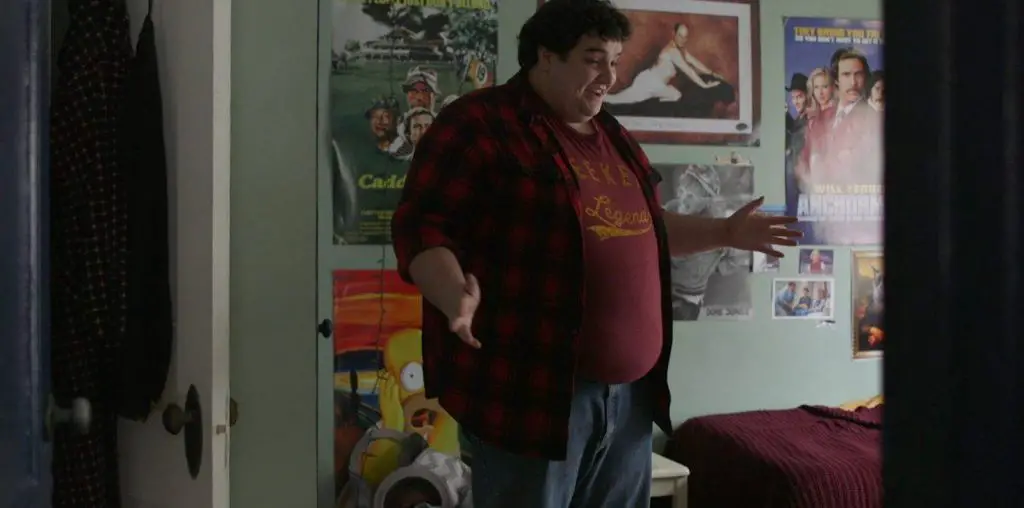
“Everything Moves Alone” is a loose-limbed, breezy comedy which racks up amazing mileage with a minimum of budget and an endless supply of charm. This is one of the most delightful films rolling about today’s festival circuit and deserves to be sought out.
“Everything Moves Alone” opens in a sleepy New England town where Scotch (Philip Guerette), a recently discharged soldier, arrives at a bus depot with the vague plan of crashing with his long-estranged older brother. Scotch spies a creepy yet interesting character stealing luggage (Thomas Edward Seymour), who then offers Scotch a ride into town if he will assist in dropping dirt and a frog-shaped flower pot into another man’s car. Scotch, who is clearly several cards short of a full deck, complies and immediately earns the wrath of the car owner McDunley (Matt Ford), a bearish sourpuss who runs the local video store and who has a mysterious long-running feud with Anderson, the luggage-thief who quickly becomes Scotch’s new best friend.
Scotch’s brother is a hostile weirdo who puts numerical tags on each item of food and harbors an unnatural fascination for videos starring The Olsen Twins. The siblings barely tolerate each other but stay under the same roof, inevitably ironing out the kinks in their relationship. Scotch and Anderson spend a great deal of time together in rambling conversations ranging from the mystery of women to the pointlessness of fishing. The duo take breaks in their palaver to direct harmless yet annoying mischief at the ill-tempered McDunley, who takes to chasing Scotch with a baseball bat. Scotch and Anderson also try their hand with the ladies, the former on a disastrous date with a cutie who harbors a bizarre anti-Semitic mindframe and the latter with a waitress who keeps Anderson hydrated with an endless supply of orange juice and Coca-Cola.
“Everything Moves Alone” stumbles a little towards its final half-hour when resolutions regarding the McDunley-Anderson feud are addressed with too much speed and convenience, and a late subplot regarding a real estate transaction gets inserted haphazardly into the scheme of things (although things are eventually worked out with a wonderful sense of violence and anger which makes the turn of events worthwhile). The film also has one considerable mistake with a minor character who essays the stereotypical homosexual with no trace of wit or purpose.
But despite these hiccups, “Everything Moves Alone” is a genuinely appealing and eccentric venture where all of the characters are wonderfully off-center and whirl about in a loony parallel universe which makes mincemeat of the basic tenets of common sense and reason. In many ways, director Mike Aransky (who appears as Scotch’s bizarre brother) is the rightful heir to the legacy of John Cassavetes, creating a freewheeling yet hypnotic tale of emotionally skewered raconteurs with a gift of getting into inane trouble without pausing to question their actions or consequences. Achieving this balance is no mean feat: in the hands of lesser talent, the results could either be excessively verbose or obnoxious. With “Everything Moves Along,” it comes pretty damn close to the proverbial bullseye.
As the core of the ensemble cast, Philip Guerette’s performance as Scotch is a marvel of insouciance and barely-concealed craziness while Thomas Edward Seymour (who wrote the screenplay and musical score) as Anderson provides a casually dangerous personality which gracefully hums “I’m okay, you’re crazy” despite the fact he is clearly out of control. The real scene-stealer is Matt Ford’s McDunley, who takes rudeness and a boiling temper to hilarious depths. If this guy’s venom was converted into electricity, the energy crisis could be solved.
“Everything Moves Alone” is a Connecticut-based shoestring production, created in two weeks on a $9,000 budget with Guerette, Seymour and Aransky handling multiple technical responsibilities ranging from sharing the producing and editing chores to doubling as boom operators and gaffers while on location. Incredibly, none of the DIY struggles appear on screen, as the film has a professional look and style that can put many an indie production to shame. Hopefully, “Everything Moves Alone” will move into the right hands and reach the wide audience it richly deserves.
